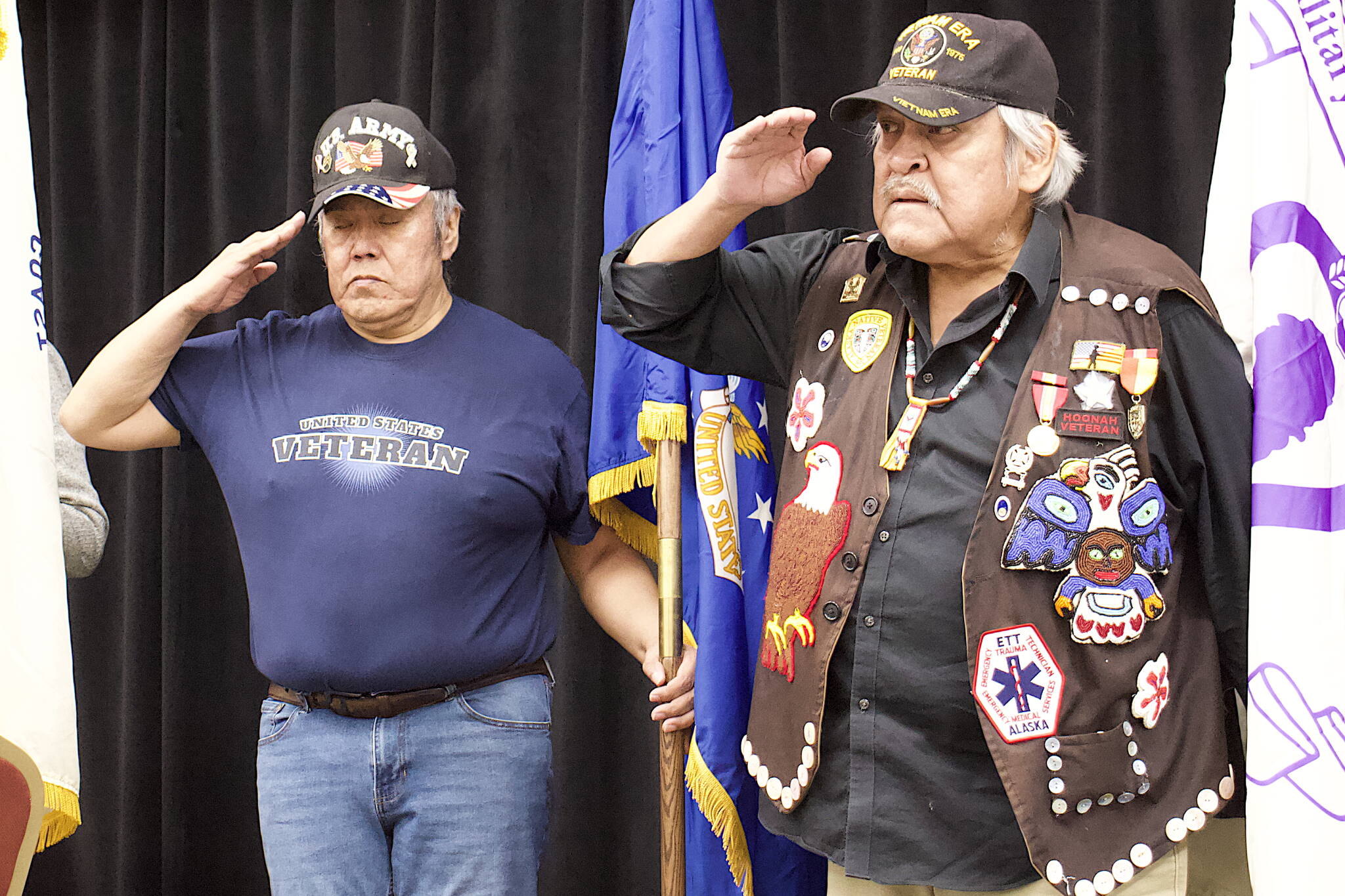When the call came for those who served during the Korean War to stand up, Mickey Lesley, 89, was the only person among those gathered at Centennial Hall to do so.
The long-ago orphan who became a cryptographer right out of school has had plenty of other notable moments of standing alone. With no family to send weekly letters to that the military demanded, she wrote instead to the orphanage where she was raised. After 13 years working for the military — being assigned to the midnight shift as a single woman — she drove herself to Alaska, where she ended up being the only woman among colleagues when she took a Department of Fish and Game job in Juneau more than 50 years ago.
Decades of adventure would follow in the company of others — which Lesley documented in journals she same way she wrote letters during the war, with the journal entries eventually being published as a book — but these days her life again is largely a singular one, especially in the wake of COVID-19 since vaccinations weren’t possible for her.
On Saturday she set aside worries about the virus as she was honored at the Juneau American Legion/Veterans of Foreign Wars annual Veterans Day ceremony at the convention hall. That was followed by an annual lunch gathering at the American Legion Auke Bay Post 25 — where, despite a second Korean War veteran joining in, she was again something of a solitary presence among her peers.
“I’m the only girl that belongs to the (local) American Legion,” Lesley said. “If I don’t show up the guys panic. They think there’s something wrong.”
Sitting across the table from her was Jack Marshall, a Juneau resident for about 40 years who served in the Gulf of Tonkin in Vietnam from 1961 to 1964, who said he’s known Lesley for decades. Like her, he’s also a retired state employee who’s written extensively in the years since, largely about history ranging from the Aleutian Island campaign during World War II to numerous local newspaper features.
“A lot of times things are getting forgotten and attention wasted,” he said. “So I look for those kinds of things and I wrote about them.”
A trio of tributes to veterans with shared similarities and distinct differences
The ceremony at Centennial Hall was one of three local events taking place annually at 11 a.m. on Nov. 11, observed internationally as Remembrance Day to commemorate the official end of First World War hostilities at that time on that date in 1918. While each shared a spirit of paying tribute to veterans for their service — and ultimate sacrifice in many cases — each gathering also had unique ways of doing so.
The first ceremony started a few minutes before 11 a.m., with about 15 people gathering in front of the Alaska State Capitol for an observation of Armistice Day, which Remembrance Day was known as in the U.S. before President Dwight Eisenhower changed it to Veterans Day in 1954, hosted by Juneau Veterans for Peace. They sang a song of peace before lining up to ring a replica of the Liberty Bell starting at exactly 11 a.m.
“VFP is trying to get back to the original intent of the day to celebrate peace and advocate for peace,” Craig Wilson, president of the local chapter, told those gathered.
A topic of conversation among some of those gathered before the ceremony began was the conflict between Hamas and Israel in Gaza, with the national VFP organization issuing a statement “in which we condemned the horrific violence on both sides, particularly the killing of civilians. We added our voice to the many calls for a ceasefire and negotiations toward a political solution because there is no military one.”
Among those ringing the bell in front of the Capitol was Christina Apathy, who said both her father and grandfather served during wars, and she has attended the local Armistice Day for the past several years.
“The bells reminded me of how the church bells must have sounded at the end of the war,” she said.
Sounds and colors of a completely different sort were heard nearby at Elizabeth Peratrovich Hall, where a Veterans Day observance hosted by Southeast Alaska Native Veterans took place. A color guard of veterans carried flags to the stage for an opening salute and prayer, followed soon after by a performance of several songs by the Woosh.ji.een Dance Group with narratives about the significance of each.
“We are honored to be able to dance here today because we have been given this space to learn who we are, where we come from and to celebrate our way of life because of your selfless acts of serving our country, because of your strength, your courage,” said Xeetli.éesh Lyle James, a leader of the dance group. “We know it didn’t end the day you ended your service. We still know about your people. You still serve your community. We hear your voice.”
An overview of efforts being made on behalf of the region’s Alaska Native veterans was presented by Desiree Duncan, senior director of Native lands and resources for the Central Council of the Tlingit and Haida Indian Tribes of Alaska. Among those is ongoing construction work on a Southeast Alaska Native Veterans memorial, including federal funding for two new totem poles, with the hope site work will be completed in the spring of 2024.
She also highlighted a federal Alaska Native Vietnam-era Veterans Land Allotment Program and efforts being made by tribal leaders to make parcels in Southeast Alaska part of it, since many locals have said they aren’t interested in parcels elsewhere in the state.
“So don’t give up,” she said.
• Contact Mark Sabbatini at mark.sabbatini@juneauempire.com or (907) 957-2306.

